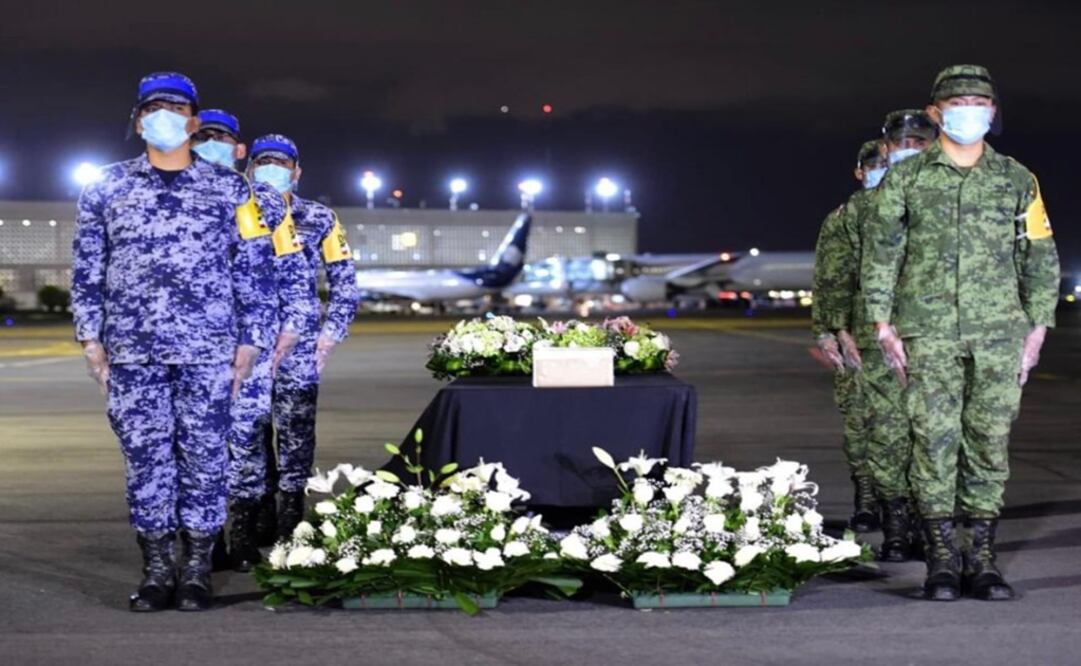Más Información

FGR entregó carpeta incompleta; defensa de marineros acusados de huachicol fiscal denuncia ausencia de dos tomos

Autoridades federales inician investigación tras agresión a líder estatal y diputada de MC; "no habrá impunidad", afirman

MC condena ataque armado contra diputados en Culiacán; crisis de violencia en Sinaloa ha rebasado todos los límites: Álvarez Máynez

T-MEC podría entrar en "modo zombie", Fitch Ratings; prevé presiones fiscales y bajo crecimiento para México en 2026

Tren Interoceánico: ¿quién es el maquinista detenido por el descarrilamiento?; tiene estudios de secundaria y cargo de garrotero de camino

Gobierno de EU se dirige a otro cierre parcial tras tiroteo en Minnesota; demócratas no apoyarían presupuesto para Seguridad
Dozens of officials from the Mexican consulate filed past the bronze doors of St. Patrick’s Cathedral in New York, carefully carrying urns containing the cremated remains of 245 compatriots who died from the coronavirus.
Clad in black, they walked one-by-one down the nave illuminated by colorful stained-glass panels to the main altar, where Cardinal Timothy Dolan blessed the immigrants’ ashes. Loved ones in the wooden pews held photographs of the deceased.
Consul for political affairs Carlos Gerardo Izzo called the weekend ceremony “a great homage” to the dead, and said he and the other urn-bearers approached their task with the utmost respect and solemnity.
“From the beginning, we were told to take our time,” he said. “We knew that what we had in our hands was not a box but the remains of a Mexican who came here to give their life for their family, for their country, and for their adopted city, New York.”
Recommended:
More than 1,500 Mexican immigrants have died of the virus in the United States, according to Jorge Islas, consul general for New York, who helped organize the prayer ceremony. Over half those deaths were in the hard-hit metropolitan area, he wrote in a column for the Mexican newspaper El Universal.
New York
City has had about 220,000 confirmed cases overall and more than 23,000 deaths from the virus, according to a running count by Johns Hopkins University, and Latino and Black communities have been hit disproportionately hard by the pandemic.
During the lockdown, many in those communities continued working in jobs classified as essential, everywhere from hospitals to supermarkets, despite the risk of exposure.
“They were the invisible heroes that allowed New York to continue with life during the pandemic,” Izzo said. “And that, sadly, cost them their lives.”
In the ceremony, a mariachi band near the altar serenaded the dead with “Mexico Lindo y Querido” — one of the genre’s most famous songs, and an exuberant celebration of patriotism and love for Mexico.
“Lovely, beloved Mexico,” its lyrics go, “if I die far from you, may they say that I’m asleep and may they bring me back here.”
Afterward, the urns were taken to La Guardia Airport and put on a Mexican air force plane. Islas flew with them to Mexico City, where he tweeted nighttime images of a military honor guard receiving the remains on the tarmac.
Many Mexican immigrants in New York City come from the central state of Puebla, and more than 100 of the 245 urns were returned to that state, Izzo said.
Islas wrote that during the flight he reflected on what the pandemic has meant for the Mexican immigrant community in the United States, particularly those in the country illegally, and was filled with a sense of pride.
Recommended:
“They showed during the toughest moments of the coronavirus their disposition to work,” he wrote. “In good part out of necessity, but without fear to fulfill their duties and responsibilities to provide for their families in New York and in Mexico, which has a great dependence on the remittances that, month after month, they do not cease to send to their various hometowns.”
“Thanks to these heroes, who are known as the ‘frontliners,’ this city was able to keep working,” said the Mexican consul in New York, Jorge Isla López, who traveled with the urns back to Mexico.
“They were workers who were in the front line of defense (…) whether it was preparing foods in restaurant kitchens, working in construction, cleaning hospitals… They were invisible and anonymous heroes that allowed all New Yorkers to stay home, and that cost us a lot, it cost us lives,” he asserted.
“Mexicans are people devoted to working, we are productive people, we are honest people. There are the ones who gave it all for this city to keep working,” he said to media outlets.
The ceremony was attended by a hundred relatives who were visibly saddened and wore face masks and gloves while they prayed in front of the 245 urns that contain the ashes of the victims of this pandemic, and that were located in the majestic altar of the church covered by a piece of white fabric.
One of those invisible heroes was Amelia Méndez Viver, Lina Méndez’s mother, who passed away at 65 on April 12 due to a heart attack caused by COVID-19 after spending two weeks in a hospital
Amelia lived for 25 years in New York and worked as a cleaning lady in a NY house.
Recommended:
“It was on March 28 that my mother got sick at home; she was taken [to the hosital] in an ambulance; I was not allowed to go with her. Do you know how painful it is to see your mother go away and never seeing her again? I never thought it would be the last time I would see her,” said Lina Méndez to EFE after the ceremony.
Méndez, who was wearing black, asserted that when they began hearing about the virus in China, they never thought it would arrive in the U.S. so fast and urged her fellow Mexican citizens to take care of their health and follow the measures to try to halt the spread of the disease.
“She had been here for over 20 years. She wished to return to Mexico , but not this way, not in ashes . She didn’t want to be cremated, she wanted to be buried,” Regretted the Mexican with tears.
“They will be delivered today so that, starting tomorrow, they begin being delivered and sent to the corresponding states and municipalities so that they reach their final resting place,” asserted Islas López, who added that most of the victims that will be repatriated were people over 60 years old with underlying health conditions.
On August 15, Mexico’s Foreign Affairs Ministry (SRE) announced it had repatriated 18 more urns with ashes of Mexicans who died of COVID-19 in the U.S.
The SRE said the repatriation was thanks to the collaboration of Aeromexico that transported the urns for free to Mexico City all the way from Los Angeles, California.
The urns were then headed to Chiapas, the State of Mexico, Guanajuato, Guerrero, Jalisco, Morelos, Oaxaca, Puebla, Querétaro, San Luis Potosí, and Veracruz.
mp
Noticias según tus intereses
[Publicidad]
[Publicidad]








